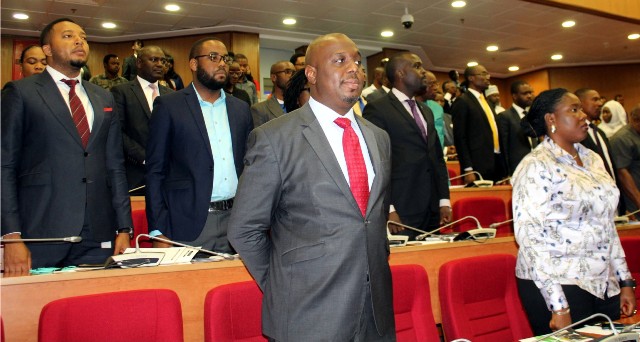Business
Wike Calls For Investments In Science Research Institutions

Governor of Rivers State, Chief Nyesom Wike has stated that investments in Science Research Institutions will help in reviving the country’s economy.
Wike made the call when the Minister of Science and Technology, Dr Ogbonnaya Onu paid him a courtesy visit at Government House, Port Harcourt recently.
Noting that a diversified economy would create employment opportunities for the people, the governor stressed the need to sustain the development of technology for the growth of the country.
He said: “I urge that we begin to use research reports from science institutes to attain the desired growth.
“The development of relevant machinery and equipment will help create jobs locally and enhance the economy”.
The Governor lauded the Minister of Science and Technology for establishing the chemical equipment institute in Port Harcourt.
He said that the Minister has exhibited maturity by siting the project in Rivers State, pointing out that other ministers would have been influenced by poltical considerations.
The Governor directed the Administrator of Greater Port Harcourt City Development Authority to liaise with the Ministry of Science and Technology for allocation of land for the institute.
Earlier, the minister said the chemical equipment and machinery development institute is a part of the process to build knowledge based economy that will sustain the country.
Onu said that the over reliance on oil and gas has made it difficult for the country’s economy to grow in view of the emerging realities.
“The decision has been made to make Nigeria an innovation driven economy. We are determined to work hard to ensure this succeeds.
“If there is a problem with oil, we will still strive. For us to do this, we need to build capacity, look inwards and use our nation’s resources in ways that will improve our economy”, he stated.
The Minister noted that the state plays a very important role in the chemical and petrochemical sector of the nation’s economy.
“We want the institute to be a centre of excellence in the chemical and petrochemical sector of the nation’s economy. The results of the research will be available to the private sector. We will be in a position to grow our economy”, he said.
Chris Oluoh
Business
Two Federal Agencies Enter Pack On Expansion, Sustainable Electricity In Niger Delta

Business
Why The AI Boom May Extend The Reign Of Natural Gas

Business
Ogun To Join Oil-Producing States ……..As NNPCL Kicks Off Commercial Oil Production At Eba

-

 Sports4 days ago
Sports4 days ago2026 WC: Nigeria, DR Congo Awaits FIFA Verdict Today
-
Politics4 days ago
ADC, PDP, LP Missing As INEC Set For By- Elections In Rivers
-

 Environment4 days ago
Environment4 days agoOxfam, partners celebrate 5 years of climate governance programmes in Nigeria
-
Politics4 days ago
FG’s Economic Policies Not Working – APC Chieftain
-

 News4 days ago
News4 days agoVictory Over Insurgency Certain, Tinubu Assures
-

 Politics4 days ago
Politics4 days ago2027: Diri Unveils RHA LG Coordinators, APC Congress Panel
-

 Politics4 days ago
Politics4 days agoReps To Meet,’Morrow Over INEC’s 2027 Election Timetable
-

 Politics4 days ago
Politics4 days agoGroup Continues Push For Real Time Election Results Transmission

